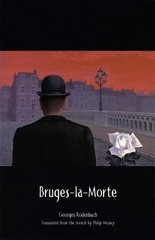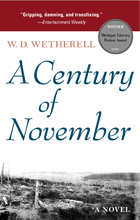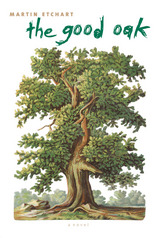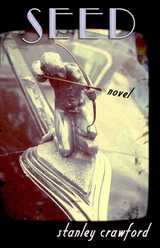4 books about Widowers

Bruges-la-Morte
Georges Rodenbach
University of Scranton Press, 2007
Bruges-la-Morte is the story of one man’s obsession with his dead wife and his soul’s struggle between an alluring young dancer—his late wife’s double—and the beautiful, melancholy city of Bruges, whose moody atmosphere mirrors his mourning. This hallmark of Belgian symbolist literature, first translated into English by Philip Mosley to great acclaim twenty years ago, is now back in print for the next generation of English readers to discover.
With penetrating psychological force and richly metaphorical language, Bruges-la-Morte draws a haunting picture of love, grief, and murder in what has become a “dead city,” severely Catholic and once proud. The source of the famous opera Die tote Stadt and endless inspiration for Belgian and French artists, this novella will enthrall both the imaginations and heartstrings of an Anglophile audience.
[more]

A Century of November
A Novel
W. D. Wetherell
University of Michigan Press, 2004
Winner of the 2004 Michigan Literary Fiction Award for novel
A haunting story of the power of death, the pain of loss, and the possibility of hope.
"Gripping, damning, and transfixing."
---Entertainment Weekly
" . . . possesses a time-bending gravity. . . . [A] small classic of graceful language and earned emotion."
---San Francisco Chronicle
". . . a beautifully written novel of war and the wrenching grief and unanswerable questions it leaves in its wake. . . . A Century of November is full of precise, startling imagery and elegant, richly poetic description---Wetherell seems genuinely incapable of writing a lazy sentence---and this last section of the novel is as surreal, hypnotic and harrowing as any literature in recent memory. The whole thing, in fact, is a jewel, an unforgettable historical novel that Wetherell has carefully (and artfully) seeded with loads of contemporary resonance." ---Star-Tribune (Minneapolis)
"A poignant, probing story. . . . Wetherell's prose and character writing are unflinching . . . [and his] take on a parent's anguish is deeply moving."
---Publishers Weekly
"A timely reminder of the devastation of mortal combat. . . ."
---Atlanta Journal-Constitution
A haunting story of the power of death, the pain of loss, and the possibility of hope.
"Gripping, damning, and transfixing."
---Entertainment Weekly
" . . . possesses a time-bending gravity. . . . [A] small classic of graceful language and earned emotion."
---San Francisco Chronicle
". . . a beautifully written novel of war and the wrenching grief and unanswerable questions it leaves in its wake. . . . A Century of November is full of precise, startling imagery and elegant, richly poetic description---Wetherell seems genuinely incapable of writing a lazy sentence---and this last section of the novel is as surreal, hypnotic and harrowing as any literature in recent memory. The whole thing, in fact, is a jewel, an unforgettable historical novel that Wetherell has carefully (and artfully) seeded with loads of contemporary resonance." ---Star-Tribune (Minneapolis)
"A poignant, probing story. . . . Wetherell's prose and character writing are unflinching . . . [and his] take on a parent's anguish is deeply moving."
---Publishers Weekly
"A timely reminder of the devastation of mortal combat. . . ."
---Atlanta Journal-Constitution
[more]

The Good Oak
Martin Etchart
University of Nevada Press, 2005
Thirteen-year-old Matt Echbar is angry at the world. His widowed father is too busy for him, and his grandfather is an embarrassment, an unschooled Basque shepherd whose language and customs are completely alien to Matt’s all-American lifestyle. Things get worse when the grandfather steals a flock of sheep and dragoons Matt into helping him drive them to a secret camp in the Arizona mountains. The ensuing adventure is one of the most compelling and delightful coming-of-age novels in recent fiction. As Matt and his aitatxi, accompanied by their two faithful sheepdogs, drive the flock across the burgeoning suburbs of Phoenix and into the remote mountains, the boy learns the ancient skills of the sheepherder and discovers the unexpected wisdom that has given his Old Country grandfather the strength and patience of a sturdy oak. By the time the journey reaches its fateful conclusion, Matt has developed a new bond with the old man and has learned that true manhood includes accepting one’s heritage.
[more]

Seed
A Novel
Stanley Crawford
University of Alabama Press, 2015
Seed is the story of Bill Starr’s final days. Childless but with a lifetime’s worth of possessions and a nearly infinite web of extended family, Bill endeavors to empty his house completely before he dies by summoning distant relatives to claim their inheritance. Many of his letters go unanswered, but those who do appear show up only to find that their reward is often much less valuable than they might expect.
What they get instead are Bill’s memories, made vivid by each item from the past, memories that are more exotic and curious than the lives currently lived by his young relatives.
Accompanied by his housekeeper, Ramona, and his young gardener, Jonathan, Bill is a somewhat cantankerous, wildly intelligent, and often forgetful man who recalls and speaks to his passed wife, often thinking that she's not dead. His unwillingness to recognize what has happened to her and to give away his only possession of any value, a 1937 Pierce-Arrow automobile that they bought together, becomes the measure of his grief and of his love in this profoundly funny novel that faces death and love sincerely.
What they get instead are Bill’s memories, made vivid by each item from the past, memories that are more exotic and curious than the lives currently lived by his young relatives.
Accompanied by his housekeeper, Ramona, and his young gardener, Jonathan, Bill is a somewhat cantankerous, wildly intelligent, and often forgetful man who recalls and speaks to his passed wife, often thinking that she's not dead. His unwillingness to recognize what has happened to her and to give away his only possession of any value, a 1937 Pierce-Arrow automobile that they bought together, becomes the measure of his grief and of his love in this profoundly funny novel that faces death and love sincerely.
[more]
READERS
Browse our collection.
PUBLISHERS
See BiblioVault's publisher services.
STUDENT SERVICES
Files for college accessibility offices.
UChicago Accessibility Resources
home | accessibility | search | about | contact us
BiblioVault ® 2001 - 2024
The University of Chicago Press









